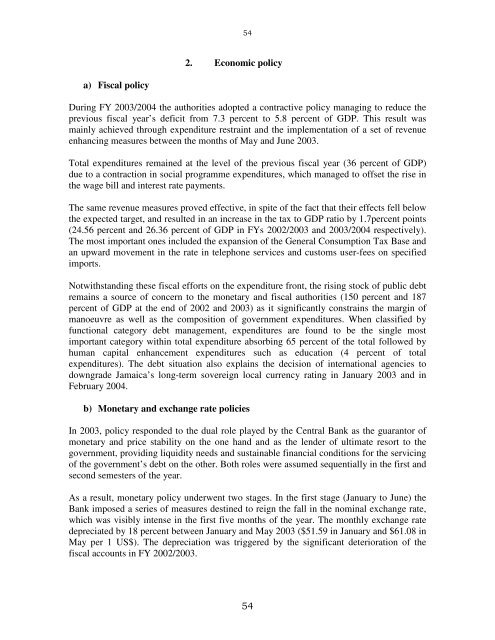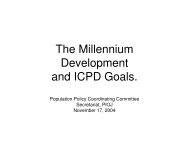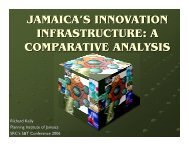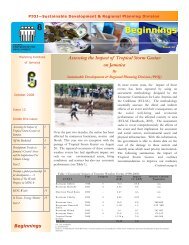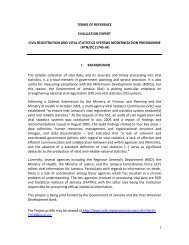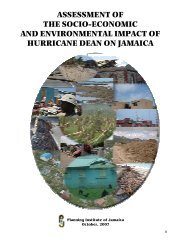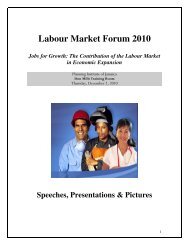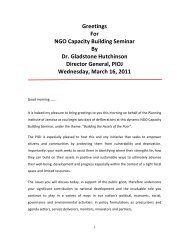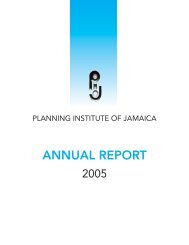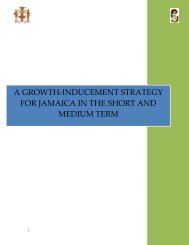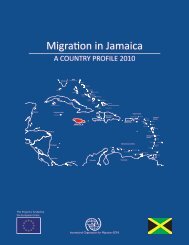Jamaica: Macro-Socio-Economic and Environmental Assessment of ...
Jamaica: Macro-Socio-Economic and Environmental Assessment of ...
Jamaica: Macro-Socio-Economic and Environmental Assessment of ...
Create successful ePaper yourself
Turn your PDF publications into a flip-book with our unique Google optimized e-Paper software.
54<br />
2. <strong>Economic</strong> policy<br />
a) Fiscal policy<br />
During FY 2003/2004 the authorities adopted a contractive policy managing to reduce the<br />
previous fiscal year’s deficit from 7.3 percent to 5.8 percent <strong>of</strong> GDP. This result was<br />
mainly achieved through expenditure restraint <strong>and</strong> the implementation <strong>of</strong> a set <strong>of</strong> revenue<br />
enhancing measures between the months <strong>of</strong> May <strong>and</strong> June 2003.<br />
Total expenditures remained at the level <strong>of</strong> the previous fiscal year (36 percent <strong>of</strong> GDP)<br />
due to a contraction in social programme expenditures, which managed to <strong>of</strong>fset the rise in<br />
the wage bill <strong>and</strong> interest rate payments.<br />
The same revenue measures proved effective, in spite <strong>of</strong> the fact that their effects fell below<br />
the expected target, <strong>and</strong> resulted in an increase in the tax to GDP ratio by 1.7percent points<br />
(24.56 percent <strong>and</strong> 26.36 percent <strong>of</strong> GDP in FYs 2002/2003 <strong>and</strong> 2003/2004 respectively).<br />
The most important ones included the expansion <strong>of</strong> the General Consumption Tax Base <strong>and</strong><br />
an upward movement in the rate in telephone services <strong>and</strong> customs user-fees on specified<br />
imports.<br />
Notwithst<strong>and</strong>ing these fiscal efforts on the expenditure front, the rising stock <strong>of</strong> public debt<br />
remains a source <strong>of</strong> concern to the monetary <strong>and</strong> fiscal authorities (150 percent <strong>and</strong> 187<br />
percent <strong>of</strong> GDP at the end <strong>of</strong> 2002 <strong>and</strong> 2003) as it significantly constrains the margin <strong>of</strong><br />
manoeuvre as well as the composition <strong>of</strong> government expenditures. When classified by<br />
functional category debt management, expenditures are found to be the single most<br />
important category within total expenditure absorbing 65 percent <strong>of</strong> the total followed by<br />
human capital enhancement expenditures such as education (4 percent <strong>of</strong> total<br />
expenditures). The debt situation also explains the decision <strong>of</strong> international agencies to<br />
downgrade <strong>Jamaica</strong>’s long-term sovereign local currency rating in January 2003 <strong>and</strong> in<br />
February 2004.<br />
b) Monetary <strong>and</strong> exchange rate policies<br />
In 2003, policy responded to the dual role played by the Central Bank as the guarantor <strong>of</strong><br />
monetary <strong>and</strong> price stability on the one h<strong>and</strong> <strong>and</strong> as the lender <strong>of</strong> ultimate resort to the<br />
government, providing liquidity needs <strong>and</strong> sustainable financial conditions for the servicing<br />
<strong>of</strong> the government’s debt on the other. Both roles were assumed sequentially in the first <strong>and</strong><br />
second semesters <strong>of</strong> the year.<br />
As a result, monetary policy underwent two stages. In the first stage (January to June) the<br />
Bank imposed a series <strong>of</strong> measures destined to reign the fall in the nominal exchange rate,<br />
which was visibly intense in the first five months <strong>of</strong> the year. The monthly exchange rate<br />
depreciated by 18 percent between January <strong>and</strong> May 2003 ($51.59 in January <strong>and</strong> $61.08 in<br />
May per 1 US$). The depreciation was triggered by the significant deterioration <strong>of</strong> the<br />
fiscal accounts in FY 2002/2003.<br />
54


